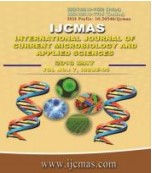


 National Academy of Agricultural Sciences (NAAS)
National Academy of Agricultural Sciences (NAAS)

|
PRINT ISSN : 2319-7692
Online ISSN : 2319-7706 Issues : 12 per year Publisher : Excellent Publishers Email : editorijcmas@gmail.com / submit@ijcmas.com Editor-in-chief: Dr.M.Prakash Index Copernicus ICV 2018: 95.39 NAAS RATING 2020: 5.38 |
Indian mustard (Brassica juncea L.) occupies third place among the various oilseed crops due to its considerable economic and nutritional value. Many naturally-occurring rhizosphere bacteria colonize its roots and benefit plants by enhancing the availability of nutrients. In this study, seventy eight bacterial isolates were obtained from the rhizosphere of mustard and screened for beneficial characteristics. Thirty two rhizobacterial isolates produced indole acetic acid ranging from 1.08 to 19.95 μg/ml. Thirty-five rhizobacterial isolates showed δ-aminolevulinic acid production varying from 1.02 to 15.62 μg/ml. Thirteen isolates solubilized bound potassium on mica containing Aleksandrov medium plates and only five rhizobacterial isolates showed phosphorus solubilizing activity on Pikovskaya’s medium plates. Seed bacterization of mustard with rhizobacterial isolates HMR29 and HMR56 showed 77.5 and 47.5% increase in shoot dry weight, respectively as compared to uninoculated plants at 25 days of growth. At 50 days of plant growth, single inoculation of rhizobacterial isolates, HMR29 and HMR56 showed 108.8 and 150.63% increase in shoot dry weight in comparison to uninoculated control. Inoculation with isolates HMR29 and HMR73 caused 110.0 and 48.64% increase in shoot dry weight as well as 40.0 and 6.0% increase in root dry weight, respectively at 75 days of growth as compared to uninoculated control.
 |
 |
 |
 |
 |